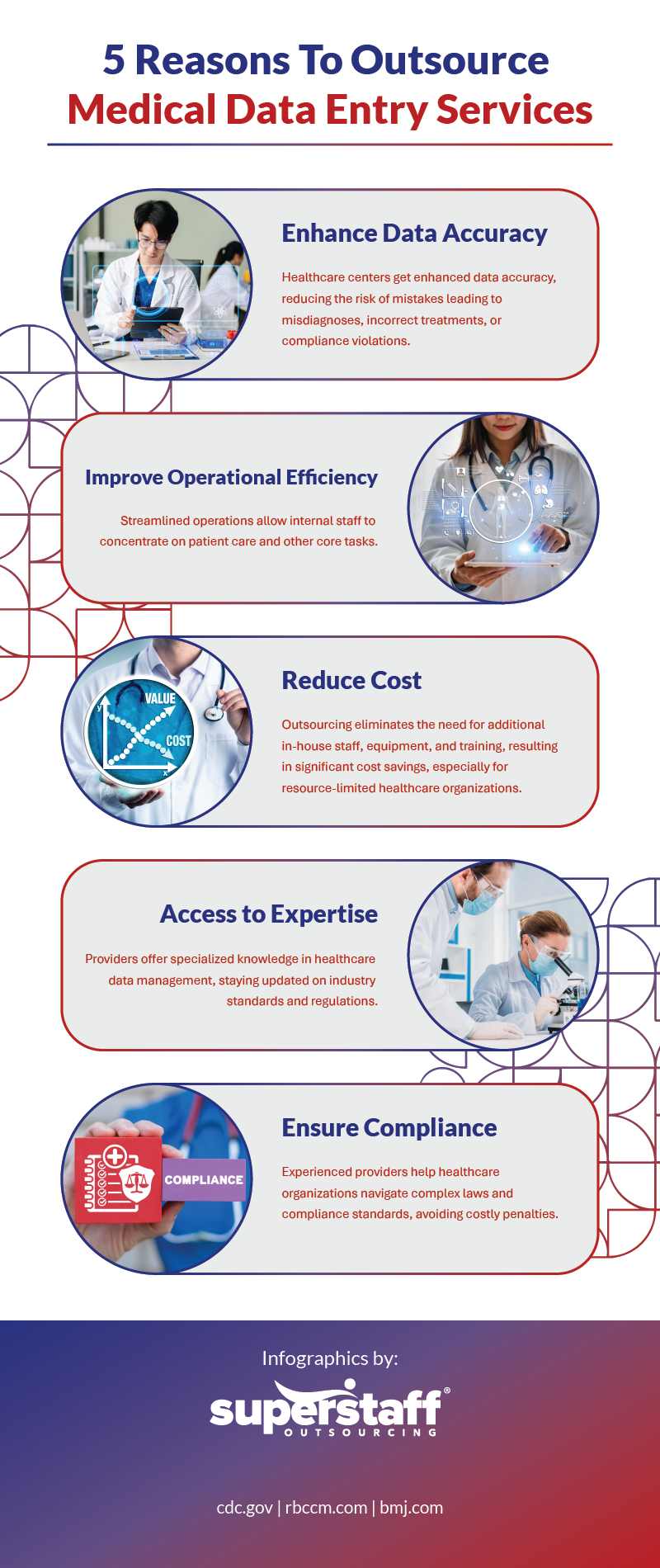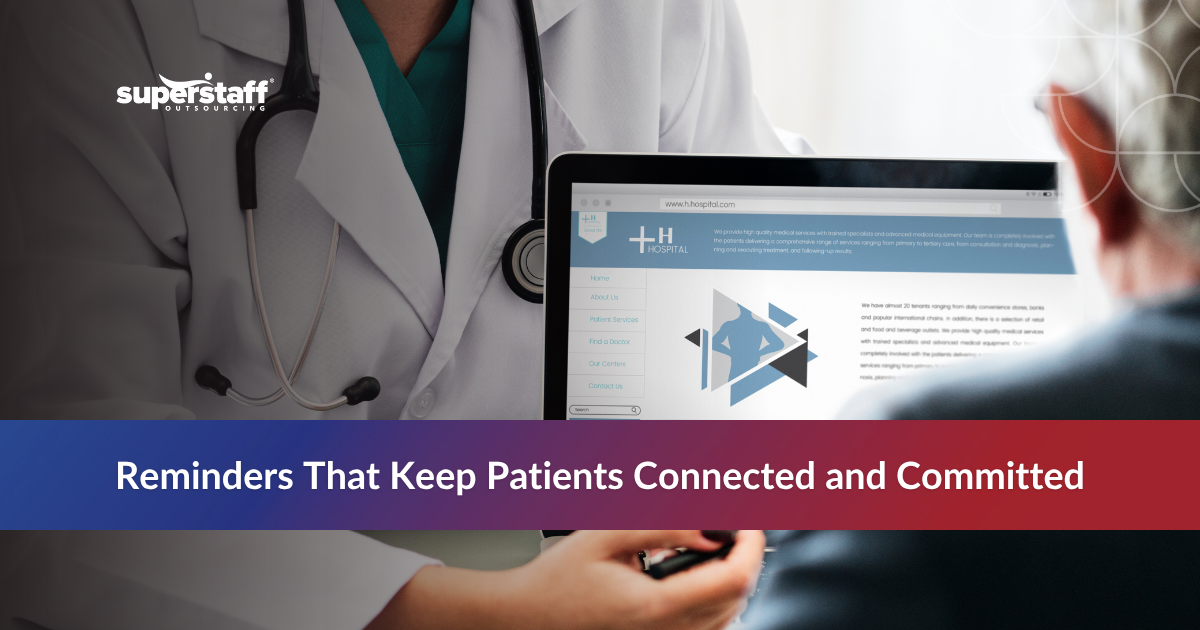
When you visit a clinic for a check-up, you must fill out a form before seeing a healthcare provider. These forms gather sensitive personal data, such as your full name, date of birth, address, and payment details like health insurance and credit card information.
This sensitive data demands careful handling by knowledgeable and trustworthy staff, as improper management can lead to serious issues.
According to RBC Capital Markets, healthcare data is expected to grow at an annual rate of 36% through 2025—outpacing many other industries. As this volume and complexity increase, accurate and timely data management becomes critical.
Precise healthcare data entry is at the core of quality patient care and seamless operations. Mistakes in data entry can lead to misdiagnoses, inaccurate medical billing, and compliance violations, potentially leading to legal penalties.
Furthermore, inefficient data entry in healthcare creates administrative bottlenecks, diverting valuable resources from direct patient care.
Outsourcing medical record data entry services can help address these challenges. By partnering with experts like SuperStaff, healthcare organizations can tap into specialized skills to improve accuracy, operational efficiency, and cost-effectiveness.
What is Medical Data Entry?
Medical data entry involves inputting and updating patient information, treatment records, billing details, and other essential healthcare data into digital systems. This process ensures accurate records, supports quality patient care, and upholds regulatory compliance.
Access to accurate medical data is crucial in healthcare, as even the smallest slip-ups can lead to significant consequences. Incorrect health insurance data entry can result in misdiagnoses, delayed treatments, and potentially life-threatening medical errors.
Studies have shown that medical errors, including those caused by documentation inaccuracies, are the third cause of death in the US, according to the BMJ.
Manual data entry is often prone to human error. It involves many repetitive tasks, requiring constant updates and meticulous attention to detail.
On the other hand, automated medical insurance data entry systems can reduce some errors associated with manual processes. However, they still require careful oversight to ensure the information remains accurate and complete.
Challenges in Medical Data Entry
- High data volume: Healthcare facilities manage enormous amounts of information, from patient histories to billing records. Manually handling this data increases the risk of errors.
- Repetitive tasks: Data entry is tedious and can lead to fatigue, increasing the chance of mistakes.
- Need for consistent updates: You need to update patient records regularly for accurate treatment and regulatory compliance. Outdated information can result in improper care and legal issues.
Types of Medical Data Entry to Outsource
Hospitals and healthcare centers manage volumes of patient data that sometimes can be too much to handle. Here are some examples of information your outsourcing partners can help oversee:
1. Patient Medical Record Entries
Outsourcing patient medical record entry ensures that critical information in your database—such as demographics, clinical history, allergies, and medication—is meticulously maintained. This reduces the chances of errors leading to misdiagnoses or incorrect treatments while supporting continuity of care and allowing more personalized, effective treatment plans.
2. Medical Billing and Coding Data
Medical coding assigns standardized codes, like ICD (International Classification of Diseases), CPT (Current Procedural Terminology), and HCPCS (Healthcare Common Procedure Coding System), to diagnoses, treatments, and procedures to document patient services accurately.
Medical billing then uses these codes to create claims for insurance reimbursement, translating healthcare services into a processable format for insurers.
Both billing and coding are specialized tasks that require accuracy. Errors can lead to claim rejections, delayed reimbursements, and compliance issues. Outsourcing these functions helps healthcare organizations streamline their medical procedure, treatment, medication, and DME billing, reduce administrative burdens, and decrease insurance claim rejections.
3. Insurance Claims Processing
Insurance claims include details about the policyholder, medical services provided, diagnosis and treatment codes, costs, and verification documentation.
The claims process involves verifying patient eligibility, reviewing code accuracy, calculating coverage, and ensuring compliance while tracking approvals, denials, adjustments, and communications with insurers.
Handling insurance claims requires extensive data entry and coordination with insurance companies. Outsourcing medical claims data entry and other BPO healthcare processes can speed up reimbursement, improve cash flow, and minimize the risk of claim denials.
4. Clinical Data Entry for Research and Trials
Clinical data entry for research and trials involves systematically collecting and managing data from patient records, trial protocols, lab results, and questionnaires. This includes demographic information, medical history, treatment details, and outcomes.
To maintain the validity of research findings, the data must be accurately organized and entered into electronic databases or clinical data management systems (CDMS), ensuring consistency and completeness.
Healthcare organizations conducting clinical research generate vast amounts of data that require careful recording and analysis. Outsourcing clinical data entry enhances reporting speed and accuracy, which is vital for the success of clinical trials. Health data entry and management errors can skew results and delay approvals for new treatments or medications.
5 Reasons To Outsource Medical Data Entry Services
1. Enhance Data Accuracy
Outsourcing medical data entry allows healthcare organizations to leverage the expertise of specialized teams trained to handle complex medical terminology, coding, and sensitive patient information.
These teams stay up-to-date on evolving healthcare data entry and management standards and practices to keep databases well-organized and free from redundant or obsolete information. Accuracy is critical in preventing costly mistakes, such as miscoding diagnoses or incorrect patient data.
By minimizing these errors, hospitals and healthcare centers can enhance the quality of care and maintain their reputation for precision and reliability.
2. Improve Operational Efficiency
Outsourcing medical data entry allows in-house teams to focus on their core medical responsibilities, such as patient care and diagnostics, without the distraction of administrative tasks like data entry.
Providers reduce backlogs and expedite patient information processing by handling data management’s repetitive and time-consuming aspects. This results in quicker turnaround times and enhanced patient satisfaction.
If you experience fluctuating patient volumes, outsourcing can help manage peaks in demand without overwhelming internal staff.
3. Reduce Costs
One of the most compelling reasons to outsource medical data entry is the potential for cost savings. Outsourcing can allow hospitals to avoid expenses related to hiring, training, and maintaining in-house employees.
Additionally, an outsourced team can enable healthcare providers to scale services based on demand, expanding capabilities during peak seasons while reducing overhead costs during slower periods. This flexibility redirects savings to critical areas of the organization, such as improving patient care or investing in new technologies.
4. Access to Expertise
Medical outsourcing providers offer access to industry experts well-versed in the latest regulations, billing codes, and technological advancements. These specialized teams excel at handling complex data entry tasks, such as medical billing and coding, delivering expertise that general administrative staff typically lack.
5. Ensure Compliance
The healthcare industry is governed by strict patient data privacy, billing, and record-keeping regulations. Non-compliance can lead to severe penalties and legal issues for providers.
Outsourcing can ensure that your data management aligns with current healthcare laws, like the Health Insurance Portability and Accountability Act (HIPAA). Expert teams receive specialized training to comply with rigorous standards, helping to mitigate risks and avoid potential legal complications.
Outsource Your Way to Healthcare Efficiency
As healthcare data grows in volume and complexity, organizations must prioritize accurate and efficient data entry to ensure quality patient care and regulatory compliance.
By outsourcing medical record data, healthcare providers can access specialized expertise, streamline operations, and reduce costs. This approach enables organizations to focus on delivering exceptional patient care while managing data-related risks.
To stay competitive and prioritize what matters most, consider outsourcing to a reliable provider like SuperStaff. With our healthcare back-office service solutions, you can alleviate administrative burdens, improve operational flow, and stay compliant with industry regulations.
Contact us today to learn how we can help your healthcare organization manage data more efficiently and effectively.







